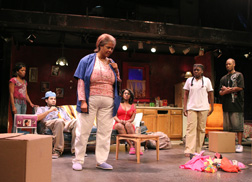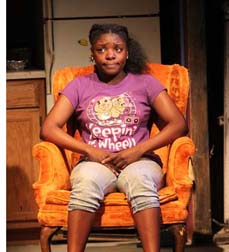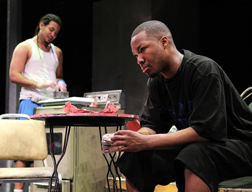By Lucy Komisar
For me the most shocking moment in Katori Hall’s play, Hurt Village, was when two grungy teens amuse themselves with a nasty rap in which they cruelly and crudely insult each other and their families. In this down-at-the-heels housing project in Memphis, even these kids’ amusement is mean and self-destructive. Forget about normal civility. The people we meet address each other as nigger, bitch, and mother fucker.
What kind of people would do that? Low-lifes, yes. But self-hating, self-destructive low-lifes.
If you think this window of life in the underclass is any kind of celebration of free spirits, please think again, because their way generally ends in death or jail or addiction. This vivid, expressive play is a tragedy. And director Patricia McGregor does not sugar-coat it.
The venue is the ironically-named Hurt Village. A federal grant, the kind the right-wing rails at for helping the poor, is not surprisingly being used to evict them and clear the land to give it to private developers to make pricey condos.

People in the project were promised better places to live. Big Mama dreams of going into federal Section 8 housing. But then she is informed that as a veterans hospital orderly, she earns $387 a month too much.
There’s little love between most of the characters in Hurt Village. There’s only a moment when Crank (Marsha Stephanie Blake) admits to love for her 13-year-old daughter Cookie (Joaquina Kalukango). Crank learned hairdressing, but does it off-the-books while collecting welfare. She is functionally illiterate and exudes a sense of being boxed in to a place from whence she cannot escape.
Cookie’s father, Buggy (his fury well vented by Corey Hawkins), skipped out when she was three and has just returned from ten years as a soldier in Iraq. He shows his affection by telling her that if she wants to get ahead, she’d better learn how to talk. (Amen. Projects dialect will keep you in the projects.)
Speaking about learning to talk, I found the raps mostly unintelligible – I would have liked supertitles. And sometimes the dialogue of the characters was in such thick black southern dialect, that I couldn’t make that out either.

Cookie, the heroine, superbly portrayed by Kalukango, is sassy and full of guts and ambition which seems destined to be snuffed out. Cookie is bright. She wants to be a flight attendant because then you can go anywhere you want to.
She’s in the 7th grade and is doing a science project. It becomes her metaphor. She puts fleas in a glass jar. When they jump up to get out, they hit their heads on the lid. Her theory is that after a while, even after she removes the lid, they won’t jump up above the lid. Except one of them gets out. A local teenager, Skillet (Lloyd Watts), ventures that the flea got out because it didn‘t give up. It’s a hokey device, but it makes the point.
Cookie’s only chance is if she takes after her great-grandmother, Big Mama (Buggy’s grandmother), the quietly powerful Tonya Pinkins, who tries desperately to get her brood to keep away from using and dealing crack. She is only 55, which tells you something about the age at which the line of women leading to Cookie became mothers. Crank is 26 and had Cookie when she was 13.
You are overwhelmed by their dysfunction and self-destructiveness, how they are filled with barely disguised self-hatred. Then you learn some other things. Big Mama’s daughter/Buggy’s mother Tiffany died from an overdose of crack after she was gang raped in an attack led by the local drug dealer. And that crack dealer (Ron Cephas Jones) says he wants his own kids to have a chance, not to live in the hell he helped create. (A conflict, no?)

Buggy tosses fitfully in his sleep. He relives the bombs that blew apart a comrade. He got a bad conduct discharge; we don‘t know why, but we can guess it was due to the lack of control from traumatic stress disorder. And as he is denied veteran’s benefits, he agonizes over the invitation of Cornbread (Nicholas Christoper), Crank’s sometimes lover, to get into the crack business.
The play is powerful, often depressing. Why can’t any of these people take control of their own lives? Katori Hall makes a few excuses, but not too many. She has created a vivid picture of the dysfunctional underclass, and it’s not very pretty. There’s just a glimmer of hope some of them might escape.
Hurt Village. Written by Katori Hall; directed by Patricia McGregor. Signature Theatre Company at Signature Center, 480 West 42nd Street, New York City. 212-244-7529.Opened Feb 27, 2012; closes March 25, 2012.


Pingback: New York Ethics: It takes a Fed | The Komisar Scoop